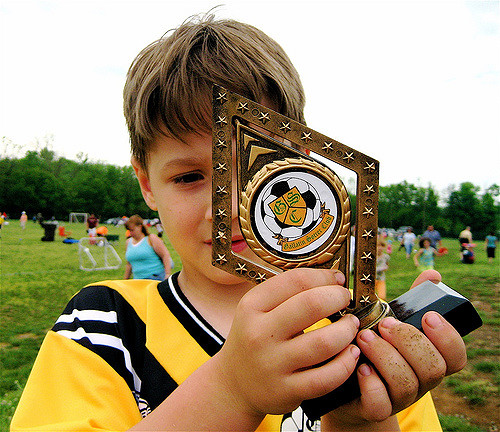Remember field day, the day that most kids looked forward to?
It was the day that our teachers were kind enough to break the monotony of staring at brightly colored alphabet letters, scotch taped over a cement-block wall that was painted the exact color of a yawn. Where they would take us all out to spend the day in the sun, and pit us against each other in a race to carry an egg across the playground. Or stuff us into old burlap potato sacks and order us to jump like our lives depended on it.
Unfortunately, I remember it well.
It’s probably best to just admit that I was an artist, and definitely not an athlete.
As a result, field day was the day that I would try everything not to attend—from being sick to negotiating a dentist visit. When I was eight years old, I got the brilliant idea to tell my grandmother that I was bleeding when I went to the bathroom. Naturally, at that age, I’d been thinking “out of my butt.” It sent my grandmother into a tizzy that I did not entirely understand until much later in life. One very embarrassing conversation with my angry grandmother later, and I was being signed into school.
The fact is, I hated field day because I never won anything.
People like me don’t hop in burlap sacks and expect anything short of a trip to the hospital.
So I’d stand off to the side, hoping that I could make myself small enough to not be noticed and pulled into whatever event my teachers had deemed “really fun.” My friends would all come running up to me, the brightly colored ribbons pinned to their chests proudly proclaiming what place they had landed in a particular event. I would stare at them longingly and try really hard to look like I didn’t care.
Participation ribbons, however, are what helped to birth a more self-entitled generation.
I am pretty certain whoever invented them lived with similar experiences to the ones I had during field day.
So, yeah, I get it.
But while I believe that creating participation ribbons and the subsequent removal of first, second, and third place ribbons came from a place of good intentions, with the hope that all children would feel included, I also believe that participation ribbons are are seriously f*cking up our society.
They have taught children—who are now entering adulthood—that all they have to do to be rewarded is show up.
That there is no first place, no winner. That everyone is equal. That there is no need to fight for anything you want because you’re all going to get the same thing.
But this is simply not true.
While I love to write and be creative in various ways, I am forced to have an actual day job. Every year, we have an end of the year review. Every year, my coworkers and I are judged, stacked, and ranked against our peers, and ultimately given a merit increase or not, based on not just on our own performance, but also on how we did compared to our co-workers.
Every single day in the real world, our lives revolve around being the best. We are all observed, judged, reviewed, and rewarded accordingly. Some people have performance metrics. Sales folks have quotas. None of us gets rewarded for just showing up. And in this day and age, with this economy, if we aren’t the very best of the best, we aren’t employed.
My friends with children are all frustrated over this idea that “everyone is a winner.”
A good friend’s daughter is failing a class in high school, and her most recent excuse for the failing grade is that she does not want to do a project because she doesn’t think it’s “fair” that she be judged, or given a grade—so she just doesn’t do the work at all.
Another friend’s children have proudly proclaimed that the reason they don’t want to do chores is because they are lazy. But these same children expect their allowances every week for either doing nothing at all, or being nagged into doing said chores.
Unfortunately, it’s not just kids who buy into this.
About once a week, I receive a phone call from my sister that usually starts off with something like, “Omg, this kid was in my office today…”
These calls are always the highlight of my week. My sister is a teacher at a major university. That means that these are not actually kids, but young adults ranging from age 18 to 24.
When I was just starting to put together the outline for this article, I asked her what her favorite example was, and she said it was the parents who went to the president of the college following a meeting that she had with their daughter. The parents had never contacted my sister directly, and despite my sister asking their daughter several times if there was anything else she needed, part of their complaint was that she hadn’t answered all of their daughter’s questions. They told the president that their daughter felt like “just a number,” and felt as though my sister had “destroyed their daughter’s spirit.”
A little later in the conversation, she told me that it is common for students to threaten her with harming themselves over a well-deserved failing grade.
The first time my kids came home from school with a participation ribbon, we sat down and discussed it. I asked them about the events that they had participated in. I smiled and asked them if they kicked everyone’s butt, and gave them the appropriately excited high fives for the yes’ and sad faces with a consoling squeeze for the no’s.
My kids saved money to buy the things they wanted, used their own money to replace the things they broke, and were taught that no one is going to just hand you anything. That’s not to say that my kids weren’t spoiled rotten in their own ways, because they were. But simply not in a way that gave them the wrong idea about the world we live in.
We can all do our part to better the world we live in. And we can start by appropriately rewarding our children for their hard work and dedication. If we give our children something to work toward, and we don’t hand them rewards for simply showing up, we are helping our own futures immensely. And isn’t that reward enough?
~
Author: Julie Livingston
Image: CJ Sorg/Flickr
Editor: Catherine Monkman


 Share on bsky
Share on bsky





Read 0 comments and reply